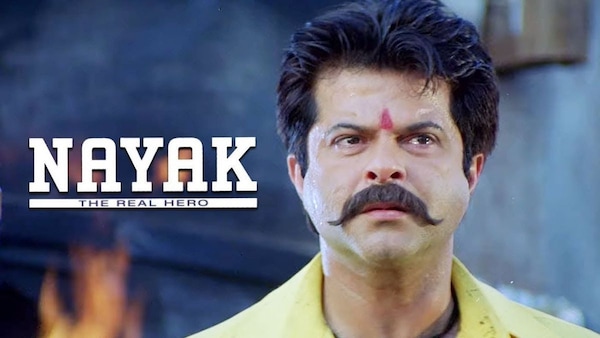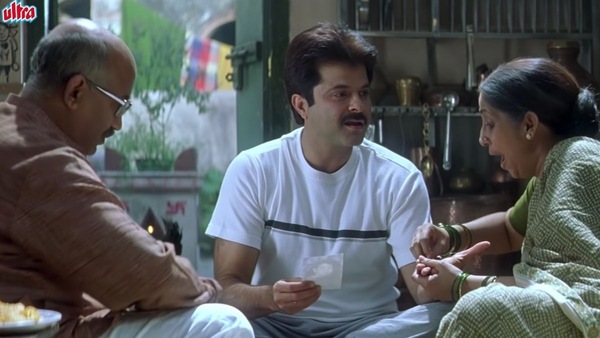Revisiting Anil Kapoor’s Nayak ahead of its 20th anniversary: Could Shankar’s idealism work today?
As Nayak clocks in 20 years, here’s a throwback on what was arguably Anil Kapoor’s finest feature that successfully punched up to privilege.

Last Updated: 12.47 PM, Sep 03, 2021
Director S Shankar took on a rather challenging premise when he began work on his 2001 feature starring Anil Kapoor in the lead. Yet, it wasn’t an original idea that was going on the floors. Shankar decided to take the self-indulgent step of remaking his 1999 Tamil blockbuster Mudhalvan.
The ambitious project saw Kapoor take on the mantle of an everyday man Shivaji Rao Gaekwad, a television cameraman-turned-presenter. A simple man with basic needs in life, Shivaji loved his share of family time, when he playfully teased his parents about their idiosyncrasies. His life had a languid pace, everything in place in a ‘normal’ fashion. A small world, steadfastly driven by idealistic principles, the Gaekwad family was the prototype of middle-class utopianism, one that strives to find the perfect blend between “what should be” and “what is.”

Thus, Shivaji’s confrontation with Maharashtra Chief Minister Balraj Chauhan (Amrish Puri) results in obvious disillusionment. He fails to understand the need for underhanded politics when all could be solved in a clean, transparent manner. The two worlds collide and Chauhan challenges Shivaji to take his place and run the state as CM for a day. Shankar’s delightful conceit lies in precisely this cinematic moment. The filmmaker is unapologetic about the apparent farfetchedness of such a move. Constitutionally or otherwise, Shivaji’s claim to the proverbial throne seemed impossible in reality. And it was therefore Shankar’s duty to convince his viewers of the universe he created, where almost anyone could take on the reigns and rule the roost.
Understandably then, the filmmaker had to pull out the veritable big guns. From bomb disposals to the firing of hundreds of IAS officers, Shankar had his protagonist solve all problems single-handedly. A real-life superhero, Shivaji could oh-so-brilliantly walk the talk.
In retrospect, the blatant vilification of Chauhan and consequent immortalisation of Shivaji (a name purposefully given to stoke staunch Marathi sentiments of the historical warrior figure) seems not only unbelievable, but downright bizarre. But you play by Shankar’s rules in Shankar’s world, a fact consolidated by films like Jeans (1998) and the more recent Enthiran (2010).
Shankar uses poignant tropes that balance the otherwise over-the-top hyper-nationalism in the film. Relatable issues are delved into, including Manjari’s (Rani Mukerji) father blatantly refusing to welcome Shivaji as his son-in-law just because he does not have a government job, or the brilliant use of cartoons to spotlight the importance of satire in a journalist’s profession. These sit comfortably in the same world where a Shivaji fights off unrelenting goons, his naked body sheathed in mud; or him disguising himself in rustic clothing to go meet Manjari.
Another feature that bolstered Nayak’s fanfare was the use of computer-generated imagery (CGI). Shankar’s tech-geek side took over the film and injected fetching sequences into AR Rahman’s track ‘Saiyyan.’
Speaking about the film’s unprecedented connect with youngsters of the time, Kapoor made a keen observation. The actor, in an interview with Hindustan Times said, “When it (Nayak) came out, youngsters weren’t used to taking a stand the way they do today.” Shankar tapped into the potential energy of such a demography and thrust it into action. He ensured that conversation about challenging authoritarian figures or at least keeping a check on their activities, get centre-stage in a country where politics was oddly considered a sacrosanct territory.
On its 20th anniversary, it’s almost with an ironical gaze that I revisit this film, considering the feature would hardly pass muster with the present censor board. It’d promptly be touted “anti-national”, with a horde of regionalist communities up in arms against the audaciousness of the film.
Some films get hacked because they’re ‘objectionable’, while others evade vigilantism simply because they were ahead of their times.

 Premium
Premium